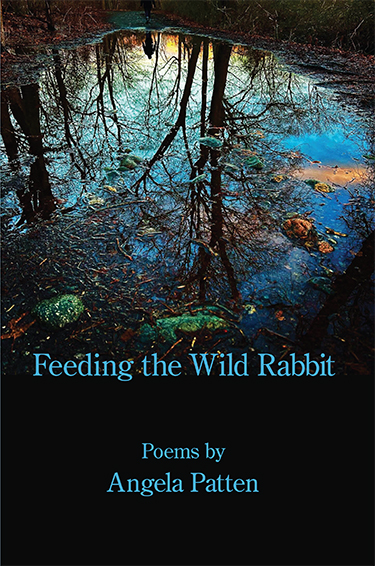Book by Angela Patten
Feeding the Wild Rabbit
Kelsay Books, 2024

Angela Patten’s fifth collection of poems, Feeding the Wild Rabbit, begins with a bravura sequence called “The Hidden Life of Words.” Midway through this spellbinding meditation on language, Patten segues to her Catholic childhood in Dublin where keeping silent was considered “good” and speaking out as a girl or woman was an offense inviting punishment. The poems that follow trace the transatlantic path she took to become a writer and teacher who fearlessly says what needs saying. In “The Place Where Poetry Happens,” she muses on the different ways inspiration might arrive, including images “that will unfurl / like a water lily, or a series of words / primed to explode on contact with the ear.” Patten’s splendid details provide the pith that keeps her work mesmerizing. Take for instance, her vision of how “Turtles, motionless as Zen masters, / pose on every sunlit log, practicing / the art of synchronized sitting.” This is a book of lyric wonders.
—Annie Deppe, author of Night Collage and other books
We think we live on earth, solid and sure, but perhaps we live most truly on the ever-flowing surface of language, in the words we speak to each other every day, in the words we heard spoken as children. Angela Patten’s new poems are about these words in the way that a lion is about a cat—they roam their wide, wide territory with a calm and wisdom that belies their fierceness. The magic of these poems is that when this lion comes to a river, it sees its face there—it believes for a moment that it is the river, and that the river “runs its own way home, holding / a kiss in its watery mouth”—the same mouth that speaks the words we speak as and how we speak. What’s not to love about that?
—David Rivard, author of Some of You Will Know and other books
To read Angela Patten’s new collection is to savor an experience that feels transactional; it reveals an intimate realm of reminiscence, wit, and provocative comparisons that freshen every passage and make the reader want to linger in her company. Some poems “[snuffle] under lichen, mud loam / the leaf mulch of the past,” contemplating the “tuberous rhizome / of family relationships” which, in Patten’s case, recall her working-class roots in mid-century Dublin. In other poems she observes the natural world and fragments of daily experience while also delighting in the musicality of language, the resonances behind individual words, and the playfulness of metaphor. This work is inviting and beautifully rendered.
—Leslie Ullman, author of Little Soul and the Selves and other books